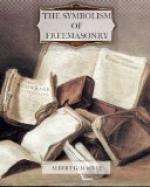Thirdly. It is contended that the very silence of Scripture in relation to the death of Hiram, the Builder, is an argument in favor of the mysterious nature of that death. A man so important in his position as to have been called the favorite of two kings,—sent by one and received by the other as a gift of surpassing value, and the donation thought worthy of a special record, would hardly have passed into oblivion, when his labor was finished, without the memento of a single line, unless his death had taken place in such a way as to render a public account of it improper. And this is supposed to have been the fact. It had become the legend of the new Mysteries, and, like those of the old ones, was only to be divulged when accompanied with the symbolic instructions which it was intended to impress upon the minds of the aspirants.
But if, on the other hand, it be admitted that the legend of the third degree is a fiction,—that the whole masonic and extra-scriptural account of Hiram Abif is simply a myth,—it could not, in the slightest degree, affect the theory which it is my object to establish. For since, in a mythic relation, as the learned Mueller[34] has observed, fact and imagination, the real and the ideal, are very closely united, and since the myth itself always arises, according to the same author, out of a necessity and unconsciousness on the part of its framers, and by impulses which act alike on all, we must go back to the Spurious Freemasonry of the Dionysiacs for the principle which led to the involuntary formation of this Hiramic myth; and then we arrive at the same result, which has been already indicated, namely, that the necessity of the religious sentiment in the Jewish mind, to which the introduction of the legend of Dionysus would have been abhorrent, led to the substitution for it of that of Hiram, in which the ideal parts of the narrative have been intimately blended with real transactions. Thus, that there was such a man as Hiram Abif; that he was the chief builder at the temple of Jerusalem; that he was the confidential friend of the kings of Israel and Tyre, which is indicated by his title of Ab, or father; and that he is not heard of after the completion of the temple,—are all historical facts. That he died by violence, and in the way described in the masonic legend, may be also true, or may be merely mythical elements incorporated into the historical narrative.
But whether this be so or not,—whether the legend be a fact or a fiction, a history or a myth,—this, at least, is certain: that it was adopted by the Solomonic Masons of the temple as a substitute for the idolatrous legend of the death of Dionysus which belonged to the Dionysiac Mysteries of the Tyrian workmen.
VII.
The Union of Speculative and Operative Masonry at the Temple of Solomon.
Thus, then, we arrive at another important epoch in the history of the origin of Freemasonry.




